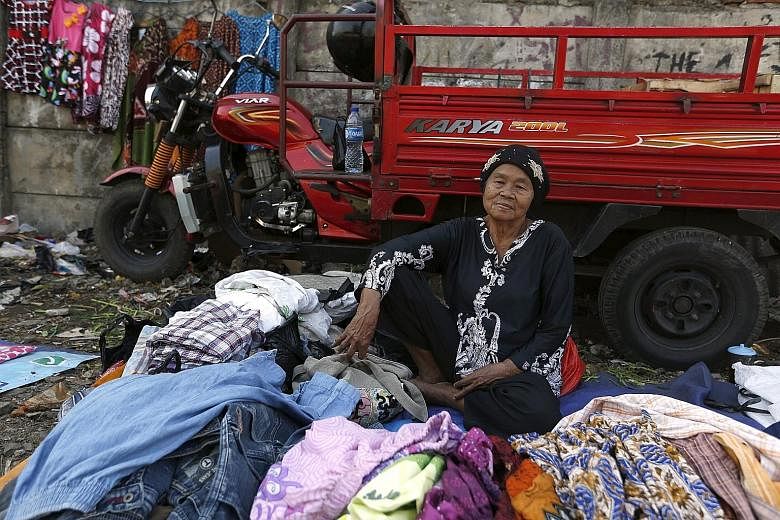JAKARTA • Indonesia's economic growth in the second quarter of this year dropped to its slowest since 2009, amid weak commodity prices and energy exports, and officials say the 5-5.2 per cent full-year target may be hard to reach.
The economy expanded 4.67 per cent in the April-June period compared with the same three months last year, well below the revised previous estimate of 4.72 per cent.
Falling commodity prices and government's strict regulation on shipments of ore weighed on the mining sector, while President Joko Widodo was unable to push badly needed infrastructure projects past bureaucratic snarls.
Domestic consumption and foreign investment remain weak, as do exports of Indonesian commodities amid China's slowdown.
"Only consumption of food and beverages increased. Other spending, such as on clothes, declined. So it will be hard (to reach the government's outlook)," Mr Suhariyanto, deputy head of the statistics bureau told reporters yesterday.
"There's no export growth anywhere in the world, so countries need to rely on domestic spending to boost GDP," said Mr Tim Condon, head of Asia research in Singapore at ING Groep NV.
-
Indonesian rupiah slides to 17-year low
-
Indonesia's rupiah fell towards a 17-year low yesterday after foreign funds sold the nation's bonds and data showed the economy grew at the slowest pace since 2009 last quarter.
The rupiah fell 0.2 per cent to close at 13,515 to the US dollar, prices from local banks show. It hit 13,553 on Monday, its weakest since August 1998, and is down 8.4 per cent this year.
The only Asian currency to have performed worse is Malaysia's ringgit.
"Investors are concerned that even with all the talk of reform and investment, we haven't seen execution on the ground," said analyst I Made Adi Saputra at PT BNI Securities in Jakarta.
BNI Securities sees the Indonesian currency weakening to 13,800 a US dollar by year-end and forecasts 2015 growth will be 4.78 per cent, Mr Saputra said.
Bank Indonesia will allow exchange-rate flexibility to conserve foreign reserves for when the US begins raising interest rates, the monetary authority's director Nanang Hendarsah said by text message yesterday.
BLOOMBERG
The government's contribution to GDP had failed to show much improvement on the first quarter. It spent less than 40 per cent of its budget up to June, with capital expenditure particularly weak.
"We expect growth in the second half to pick up on the back of investment, although we don't think government infrastructure spending will be as big as expected," said Mr Leo Putra Rinaldy, an economist at Jakarta's Mandiri Sekuritas, who expects spending cuts to control the deficit. "The government also faces challenges in revenue collection."
Mr Joko's nine-month-old administration has failed to deliver significant economic reforms, and the central bank is poorly placed to boost the economy, with inflation rising and the rupiah vulnerable to outflows once US interest rates rise.
"We hope this has hit bottom. The floor is 4.7 per cent," the President said yesterday.
Bank Indonesia governor Agus Martowardojo said authorities were closely watching the risk of a further slowdown, while noting the uncertainties posed by an anticipated rise in US interest rates that will probably suck money away from emerging markets such as Indonesia.
Finance Minister Bambang Brodjonegoro still believes GDP growth will rebound significantly in the second half of the year, on the back of higher fiscal spending."The recipe for H2 growth is to maintain household consumption growth to at least 5 per cent," he told reporters yesterday. "The second recipe is to speed up government spending."
But, analysts remained sceptical.
"As long as the rupiah keeps falling, inflation won't come down and interest rates can't be lowered," said Singapore-based global markets analyst Satoshi Okagawa of Sumitomo Mitsui Banking Corp. "Oil prices have been hitting bottom, and coal prices have fallen further, so exports won't grow. There aren't any catalysts to give the economy a lift."
REUTERS

